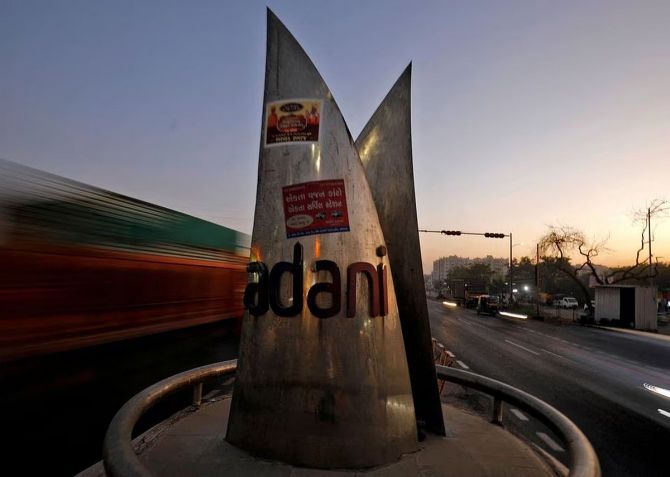In a significant win for the Adani group, the Supreme Court on Wednesday refused to transfer the probe into allegations of stock price manipulation by the Indian corporate giant to a special investigation team or the CBI, saying market regulator SEBI was conducting a "comprehensive investigation" and its conduct "inspires confidence".

Holding that the power of the court to enter the regulatory domain of Securities and Exchange Board of India (SEBI) in framing delegated legislation was limited, the apex court directed the market regulator to complete the two pending investigations expeditiously, preferably within three months.
The term delegated legislation or secondary legislation refers to laws made by individuals or bodies authorised by the legislature to create detailed regulations under a specific Act of Parliament.
A bench headed by Chief Justice D Y Chandrachud said reliance placed by the petitioners on newspaper articles or reports by third-party organisations like Organised Crime and Corruption Reporting Project (OCCRP) to question a comprehensive investigation by a specialised regulator does not inspire confidence.
The bench, also comprising Justices J B Pardiwala and Manoj Misra, noted that SEBI has completed 22 out of the 24 investigations into allegations levelled against the Adani group.
Reacting to the verdict, billionaire entrepreneur Gautam Adani said truth has prevailed and his group will continue to contribute to India's growth story.
"The Hon'ble Supreme Court's judgement shows that: Truth has prevailed. Satyameva Jayate," Adani said in a post on X. "I am grateful to those who stood by us," he added.
In its 46-page judgment, the bench said, "The facts of this case do not warrant a transfer of investigation from SEBI. In an appropriate case, this court does have the power to transfer an investigation being carried out by the authorised agency to an SIT or CBI."
"Such a power is exercised in extraordinary circumstances when the competent authority portrays a glaring, wilful and deliberate inaction in carrying out the investigation. The threshold for the transfer of investigation has not been demonstrated to exist," the verdict penned by the CJI said.
The apex court delivered its verdict on a batch of petitions on the Adani-Hindenburg Research row over allegations of stock price manipulation by the Indian business conglomerate.
The Supreme Court said the SEBI's status report and the details of the 24 investigations do not indicate inaction by the market regulator.
"In fact, to the contrary, the course of conduct by SEBI inspires confidence that SEBI is conducting a comprehensive investigation," the bench said.
It said the allegations of conflict of interest levelled against some members of the court-appointed expert committee are "unsubstantiated and are rejected".
"SEBI and the investigative agencies of the Union government shall probe into whether the loss suffered by Indian investors due to the conduct of Hindenburg Research and any other entities in taking short positions involved any infraction of the law and if so, suitable action shall be taken," the bench said.
It said the court must refrain from substituting its own wisdom for the regulatory policies of SEBI and the scope of judicial review, when examining a policy framed by a specialised regulator, is to scrutinise whether it violates fundamental rights, any provision of the Constitution, any statutory provision or is manifestly arbitrary.
"No valid grounds have been raised for this court to direct SEBI to revoke its amendments to the FPI (Foreign Portfolio Investors) regulations and the LODR (Listing Obligations and Disclosure Requirements) regulations which were made in exercise of its delegated legislative power," it said.
"The procedure followed in arriving at the current shape of the regulations does not suffer from irregularity or illegality. The FPI regulations and LODR regulations have been tightened by the amendments in question," the bench said.
It said the court has not interfered with the outcome of the investigations by SEBI and the regulator should take its probe to their logical conclusion in accordance with law.
"The reliance placed by the petitioner on the OCCPR report to suggest that SEBI was lackadaisical in conducting the investigation is rejected. A report by a third-party organisation without any attempt to verify the authenticity of its allegations cannot be regarded as conclusive proof," the court said.
The bench noted that the petitioners had also relied on a January 31, 2014, letter sent by the Directorate of Revenue Intelligence (DRI) to then SEBI chairperson which purportedly alerted the market regulator about potential stock market manipulation by the Adani group through over-valuation of the import of power equipment from a UAE-based subsidiary.
"Further, the petitioner's reliance on the letter by the DRI is misconceived as the issue has already been settled by concurrent findings of DRI's additional director general, the CESTAT and this court," it said.
The bench said the Centre and the SEBI shall constructively consider the suggestions of the expert committee in its report and take any further actions as are necessary to strengthen the regulatory framework, protect investors and ensure the orderly functioning of the securities market.
It said the public interest jurisprudence under Article 32 of the Constitution was expanded by the apex court to secure access to justice and provide ordinary citizens with the opportunity to highlight legitimate causes before the top court.
"However, petitions that lack adequate research and rely on unverified and unrelated material tend to, in fact, be counterproductive. This word of caution must be kept in mind by lawyers and members of civil society alike," it said.
The judgment was delivered on PILs filed by lawyers Vishal Tiwari, M L Sharma, Congress leader Jaya Thakur, and Anamika Jaiswal.
Adani group stocks had suffered a bloodbath on the bourses after Hindenburg Research made a litany of allegations, including those about fraudulent transactions and share-price manipulation, against the business conglomerate.
The Adani group dismissed the charges as lies, saying it complies with all laws and disclosure requirements.











 © 2025
© 2025